
Education for Chemical Engineers
Scope & Guideline
Fostering a New Era of Chemical Engineering Education
Introduction
Aims and Scopes
- Innovative Teaching Methodologies:
The journal explores various innovative teaching methodologies, including project-based learning, experiential learning, and active learning strategies that engage students and enhance their understanding of chemical engineering principles. - Integration of Technology in Education:
It emphasizes the use of digital tools, simulations, and virtual reality in chemical engineering education, providing insights into how these technologies can improve learning outcomes and facilitate remote learning. - Sustainability and Ecological Awareness:
The journal promotes the incorporation of sustainability principles and ecological economics into chemical engineering curricula, preparing students to address contemporary challenges related to environmental sustainability. - Collaboration Between Academia and Industry:
There is a strong focus on bridging the gap between academic education and industry needs, encouraging collaboration through internships, projects, and real-world problem-solving. - Assessment and Feedback Mechanisms:
The journal discusses innovative assessment strategies and feedback mechanisms that enhance student learning and performance, focusing on formative assessments and peer feedback. - Interdisciplinary Approaches:
It encourages interdisciplinary learning experiences, integrating knowledge from various fields to enrich the educational experience of chemical engineering students.
Trending and Emerging
- Use of Artificial Intelligence and Machine Learning:
There is a growing exploration of AI and machine learning applications in chemical engineering education, showcasing hands-on activities that prepare students for future industry demands. - Virtual and Augmented Reality in Education:
The integration of VR and AR technologies is trending, with research focusing on their impact on student engagement and learning effectiveness in chemical engineering courses. - Sustainable Development Goals (SDGs) in Curriculum:
The incorporation of SDGs into chemical engineering education is gaining traction, reflecting a global emphasis on sustainability and responsible engineering practices. - Competency-Based Education:
There is an increasing focus on competency-based education models that prioritize the development of essential skills and competencies in chemical engineering students. - Feedback and Self-Assessment Mechanisms:
Emerging themes include the importance of feedback and self-assessment tools that empower students to take control of their learning process and improve their academic outcomes. - Interdisciplinary Project-Based Learning:
Research is trending towards project-based learning that spans multiple disciplines, facilitating collaboration and enhancing problem-solving skills among students.
Declining or Waning
- Traditional Lecture-Based Learning:
There has been a noticeable shift away from traditional lecture-based teaching methods, as the emphasis has moved towards more interactive and student-centered learning approaches. - Basic Theoretical Knowledge without Practical Application:
Papers focusing solely on theoretical aspects without practical applications or hands-on experiences are becoming less common, as there is a growing demand for experiential learning. - Single-Disciplinary Focus:
The scope of research is increasingly leaning towards interdisciplinary approaches, causing a decline in papers that focus exclusively on chemical engineering without integrating other relevant fields. - Conventional Assessment Methods:
Traditional assessment methods are being phased out in favor of more innovative and formative assessment strategies that provide better insights into student learning. - Static Curriculum Models:
There is a decreasing trend in the discussion of static and unchanging curriculum models, as educators are now more focused on developing dynamic and adaptable curricula that respond to industry needs.
Similar Journals

Journal of Civil Engineering Education
Transforming Learning in Civil EngineeringJournal of Civil Engineering Education, published by the ASCE-AMERICAN SOCIETY OF CIVIL ENGINEERS, is a premier academic platform dedicated to advancing the field of civil engineering education. With an ISSN of 2643-9107 and an E-ISSN of 2643-9115, this journal has emerged as a critical resource for scholars, practitioners, and educators alike. As an open access journal located in the United States, it aims to disseminate innovative educational practices, research findings, and case studies pertinent to civil engineering across multiple categories, including civil and structural engineering, industrial relations, and strategy and management. Recognized for its caliber, the journal holds a Q2 ranking in its respective fields as of 2023, contributing to its credibility and relevance in the academic community. The journal serves as a vital resource for enhancing pedagogical approaches and practices, fostering collaboration among professionals, and utilizing modern methodologies in engineering education. With convergence years spanning from 2020 to 2025, it actively encourages contributions that challenge conventional frameworks and promote excellence in civil engineering education.

Journal of University Teaching and Learning Practice
Advancing Pedagogical Excellence in Higher EducationWelcome to the Journal of University Teaching and Learning Practice, a premier publication dedicated to advancing research and practice in higher education. Published by UNIV WOLLONGONG, this journal provides a vital platform for educators, researchers, and practitioners to explore innovative teaching methodologies and learning strategies to enhance the university experience. With an impressive impact factor and categorized in the Q2 quartile for Education in 2023, this journal ranks in the top percentile of educational research, boasting a Scopus rank of 437 out of 1543 in Social Sciences Education. Since its inception in 2016, the journal has become a significant contributor to the field, fostering a scholarly dialogue among scholars from around the globe. Although currently not operating under an Open Access model, it offers valuable insights and is committed to publishing high-quality research that reflects best practices in educational settings. Join our community of academics dedicated to transforming university teaching and learning through rigorous scholarship and innovative practices.
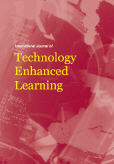
International Journal of Technology Enhanced Learning
Innovating Education: Where Technology Meets LearningInternational Journal of Technology Enhanced Learning, published by INDERSCIENCE ENTERPRISES LTD, is a premier scholarly journal that comprehensively explores the intersection of technology and education, fostering innovative approaches to enhance learning processes. Established in 2008 and continuing through 2024, the journal is pivotal for researchers, educators, and technology professionals aiming to disseminate and engage with cutting-edge developments in technology-enhanced learning environments. With an admirable ranking in Scopus—placing in the 72nd percentile of Education and 49th in Computer Science Applications—the journal reflects a robust influence in the fields of Computer Science Applications and Education, as evidenced by its Q2 and Q3 quartile rankings. The journal not only provides a platform for empirical research and theoretical discourse but also emphasizes practical implementations in e-learning. Although it does not offer open access, its curated collection of articles serves as a vital resource for scholars and practitioners who are dedicated to advancing the nexus of technology and education.

JOURNAL OF ENGINEERING TECHNOLOGY
Exploring Trends that Transform Engineering Technology.JOURNAL OF ENGINEERING TECHNOLOGY, published by the American Society for Engineering Education, serves as a vital platform for the dissemination of research and advancements in the field of engineering technology. Established in 1985, this journal has evolved through several critical phases and continues to provide a forum for researchers and educators to share innovative practices, educational methodologies, and insights into technology trends shaping the engineering landscape. Although it currently holds a Q4 ranking in the Engineering (Miscellaneous) category and occupies the 9th percentile among its peers, the journal remains committed to enhancing the visibility of emerging topics and diverse perspectives within the domain. With no open access options at this time, readers can access its published work through institutional subscriptions. The Journal of Engineering Technology is essential for professionals seeking to stay abreast of the latest developments and researchers aiming to contribute to the evolving conversation in engineering education and application.
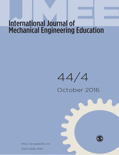
International Journal of Mechanical Engineering Education
Advancing Mechanical Minds through EducationThe International Journal of Mechanical Engineering Education, published by SAGE Publications Inc, serves as a premier platform dedicated to advancing the field of engineering education, with a specific focus on mechanical engineering. With a history dating back to 1981, this journal has established itself as a vital resource for researchers, educators, and industry professionals alike, offering insights and scholarly articles that foster innovation and improve pedagogical approaches within the discipline. The journal is currently indexed in Scopus, ranking #542 in Education and #311 in Mechanical Engineering, reflecting its significant contribution to both academic and engineering communities. Although it does not have open access options, the quality and depth of research disseminated through its pages are undeniable, making it an essential read for anyone involved in engineering education. With a Q3 categorization in both relevant fields as of 2023, the journal continually strives to enhance the learning experience and methodologies in mechanical engineering education, paving the way for a future generation of skilled engineers.
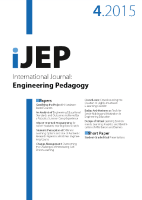
International Journal of Engineering Pedagogy
Driving Excellence in Engineering Education and ResearchInternational Journal of Engineering Pedagogy (ISSN: 2192-4880) is a leading academic journal dedicated to the advancement of educational practices within the engineering discipline. Published by the International Federation of Engineering Education Societies (IFEES), this open-access journal has been making scholarly contributions since 2011, enabling global access to cutting-edge research and methodologies. Based in Austria, the journal serves as a vital platform for researchers, educators, and industry professionals to share innovative strategies and pedagogical advancements that enhance engineering education. With a remarkable Q2 ranking in both Education and Engineering (miscellaneous) categories for 2023, it showcases studies that drive excellence in teaching and learning processes. The journal's significant presence in reputable databases, such as a rank of #228 out of 1543 in Social Sciences Education and #60 out of 307 in General Engineering within the Scopus index, underscores its influence and relevance. By converging valuable insights from 2018 to 2024, the journal continues to shape the future of engineering pedagogy, making it an indispensable resource for scholars and practitioners alike.
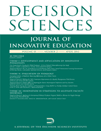
Decision Sciences-Journal of Innovative Education
Fostering innovation at the crossroads of education and management.Decision Sciences - Journal of Innovative Education is a prestigious academic journal published by WILEY, focusing on the intersecting fields of decision sciences, education, and management. With an ISSN of 1540-4595 and an E-ISSN of 1540-4609, this journal offers valuable insights and research findings aimed at fostering innovative educational practices and decision-making processes. As of 2023, it boasts an impressive Q2 ranking in several categories, including Business, Management and Accounting, Decision Sciences, and Education. This positions it within the top tier of journals in its field, reflecting its commitment to high-quality scholarship. Researchers and educators benefit from its extensive coverage of contemporary topics and methodologies, making it a vital resource for those seeking to enhance their understanding and application of innovative strategies in education. Although it does not currently offer open access, the journal remains accessible via institutional subscriptions, ensuring that its impactful research is readily available to a broad audience. The journal's scope spans from 2011 to 2024, allowing for a comprehensive exploration of evolving trends in decision sciences and education.
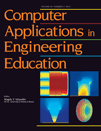
COMPUTER APPLICATIONS IN ENGINEERING EDUCATION
Innovating learning pathways in engineering with computer applications.COMPUTER APPLICATIONS IN ENGINEERING EDUCATION, published by Wiley, is a leading journal dedicated to the intersection of computer science and engineering education. With its ISSN 1061-3773 and E-ISSN 1099-0542, this journal has become a vital resource since its inception in 1992, providing valuable insights and advancements within its scope. Renowned for its high impact, the journal is categorized in the Q1 in Education and Q1 in Engineering (miscellaneous) quartiles, reflecting its significant contribution to the fields of education and engineering. The journal holds impressive Scopus rankings, including Rank #41 in General Engineering and Rank #38 in General Computer Science, positioning itself within the top echelons of relevant academic disciplines. Although it is not currently an open-access publication, it provides researchers, educators, and students with a platform to explore innovative computer applications in engineering contexts. This journal not only serves as a repository of knowledge but also fosters a community for professionals interested in enhancing educational methodologies through technology.

Chemistry Teacher International
Pioneering Effective Learning in ChemistryChemistry Teacher International is a prominent peer-reviewed journal dedicated to the field of chemistry education, published by WALTER DE GRUYTER GMBH. With its Open Access policy since 2018, this journal ensures that research is widely disseminated to educators, researchers, and practitioners globally. Located in Berlin, Germany, it aims to promote innovative teaching methodologies and practical applications in chemical sciences. The journal has consistently achieved a Q2 ranking in both the Chemistry (Miscellaneous) and Education categories as of 2023, reflecting its relevance and impact within the academic community. Over its converged years from 2019 to 2024, Chemistry Teacher International fosters a collaborative platform for sharing research, insights, and pedagogical strategies, thereby contributing to the advancement of chemistry education on a global scale.

REDU-Revista de Docencia Universitaria
Connecting Researchers and Educators for Impactful ChangeREDU-Revista de Docencia Universitaria, published by UNIV POLITECNICA VALENCIA, EDITORIAL UPV, is a prominent open-access journal dedicated to advancing the field of higher education pedagogy. Established in 2008, this journal serves as a vital platform for academics and educators to share insightful research and innovative practices aimed at improving university teaching and learning. With a commitment to fostering educational excellence, REDU promotes a rich dialogue among researchers, professionals, and students across various disciplines. The journal is indexed by notable databases, ensuring wide visibility and accessibility of published works. By addressing contemporary challenges and developments in university instruction, REDU plays a crucial role in shaping educational methodologies and informing policies within the academic landscape.